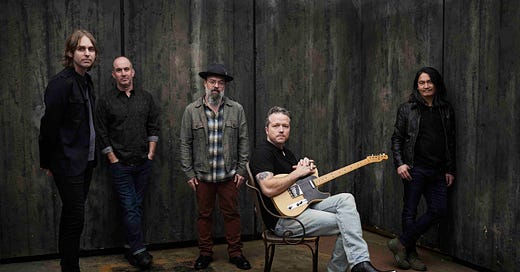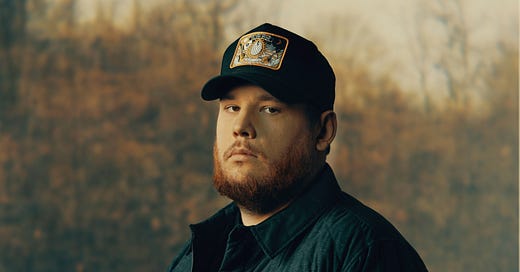
By Marissa
I’m sure I’ve told this story before, but one of the most common questions I got on book tour for HER COUNTRY (other than “how do you stay in love with a genre that doesn’t love you back,” which is…a whole other essay) was, “how did you pick these three women to focus on?” If you haven’t read it, the book centers around Kacey Musgraves, Maren Morris and Mickey Guyton, but also a score of women from The Chicks to Brandy Clark to Amanda Shires to Rissi Palmer. It aimed to be a story about everyone – everyone left behind and left out who found new ways to pave a future in a genre that bends over backwards to preserve the white, straight, cismale norm – but, because books are books, it also told a snapshot in time, and snapshot of people. And this story that I chose to tell was based around women who made the Texas to Music Row journey, and how those particular revolutionaries broke things open and paved the way.
Choosing all women from Texas was both a way to streamline a huge history, a way to weave in a political narrative that was so important to center and also something close to my heart – I spent a handful of summers in Austin when my dad lived there, hanging around with horses and getting ear infections in the pool. I didn’t realize it then, but that time very much stayed a part of me. Funny how that state just nestles in your brain and lives there forever….
That said, HER COUNTRY is not so much a set group of women in my eyes, but an evolving, changing, growing one. There are more chapters being written in real time every day, by many women and gender non-conforming folks. But if I wrote part II today, it would have one particular person at the center: Kelsea Ballerini.
I’ve long been in the Ballerini camp – and so has Natalie, as evidenced by this Billboard piece from 2015, though we do have radically different takes on Pageant Material (I adore it! This newsletter is better because we disagree on things sometimes!). This past year or two has been a very welcome Ballerini explosion, where the world finally caught up to what smart folks knew: that she was a songwriter of both unusual depth and pop savvy, a singer who emotes with an intimate casualness and precise skill, a frank talker who was willing to speak about the need for inclusion in country music, mental health and sex and a real, honest to god star. She was on the cover on Time, played SNL, grabbed some Grammy nominations and had to back-to-back exquisite albums.
The first and most important thing that cements Ballerini’s legacy is, of course, her songs. It’s funny: having success on country radio as a woman – the one chosen woman – is almost as much of a curse as it is a blessing. I think we somehow almost assume, because the quality bar on country radio for men is so low, that women’s art that makes the cut must be…mediocre (which is messed up for many reasons, especially because at the same time we demand women in country music to be extraordinary). The First Time, Ballerini’s debut, had three singles reach number one on the country charts – a huge and record-making feat for a first-time female artist, prophetic as the album title was: “Love Me Like You Mean It,” “Dibs” and “Peter Pan.” They skewed to the pop side, but they also were fun and authoritative: she loved the idea of romance, but she wasn’t taking no shit, either. But the album’s deeper cuts, like “Secondhand Smoke” (written with Jordyn Shellhart!) showed that Ballerini was capable of rare sensitivity and self-awareness. “Am I a product of a problem I couldn’t change?” she sings, tracing through her parent’s divorce.
The next two albums, Unapologetically and kelsea, continued to show her range – and her vocal development. She captures the middle space of life between fumbling teenage years and true adulthood with an artful lightness – some of my favorites here are “In Between,” “Hole in the Bottle” (you know this banger, of course), “la” and “homecoming queen?” The songs are both personal and relatable – the sweet spot, of course. I saw down with Ballerini in Nashville right before covid to talk about kelsea, and the first thing that came up was therapy. And then insecurity. “Everyone, especially my generation, is feeling that right now,” she told me. “Yeah, I’m addicted to my phone and it makes me feel weird and competitive and narcissistic and insecure, so I should probably talk about that.” That seems to be how Ballerini settles on her songs: if this happens to me, it probably happens to other people, so I should probably talk about it.
Her next two albums, Subject to Change and Rolling Up the Welcome Mat (For Good), are both notches in career trajectory that just keeps getting better – a rare feat in any genre, for certain. They have classic country bangers we’ll hear in bars and parties and weddings (if not on country radio, pshhhhhhhaawwww) for years to come – “If You Go Down (I’m Goin’ Down Too),” “You’re Drunk, Go Home” – but also really potent confessionals that are borderline folksongs,” like “What I Have” and “Leave Me Again,” a solo write that blows me away every time I listen to it. I loved how she described her writing in this phase to me when we chatted for Vulture: “sometimes the best hook is just the most obvious one.”
Those albums are the ones that helped her career skyrocket – especially Rolling Up the Welcome Mat, for the gut-punch of a way she spoke about her divorce. The Time 100 cover was wild, as was her appearance on the CMT Awards flanked by drag queens, right as her home state of Tennessee was launching a full-on assault against queer folks and drag shows. And as the story usually goes, as her star started to rise outside of Nashville, country radio retreated – she hasn’t had a solo number one since “Legends” in 2017.
And then she did something that shocked me. Well – knowing Ballerini now, it’s not that it was out of character. But it’s shocking nonetheless: she doubled down on Nashville and country music, instead of taking the pass that I am sure presented itself. She re-signed with Black River, an independent label here in Nashville. She signed on to host the upcoming CMT awards solo. She’s headlining CMA Fest this summer. Her recent releases, like “If You Go Down,” are some of the most country-sounding of her career. I support and understand and almost urge any woman or person who feels shut out and abused by this genre to seek support and community elsewhere. So much so, that agreeing to stick around almost feels radical. And, as a powerful white woman, Ballerini can kick the door open while she’s here.
So like I said, the first and most important thing that cements Ballerini’s legacy is, of course, her songs. But it’s also the fact that she’s staying a part of country music to sing them.
I think of our new mayor, Freddie O'Connell: when he was running for office, his campaign slogan was “I want you to stay” (meaning he was promising to build a place for residents and not tourists, urging people not to seek greener living pastures elsewhere). I don’t know what Ballerini’s long-term plan is, but there is so much value that comes from her decision to stay. There’s so much work to do, so many songs to sing.
If she goes down? Well, we’re going down too.
















